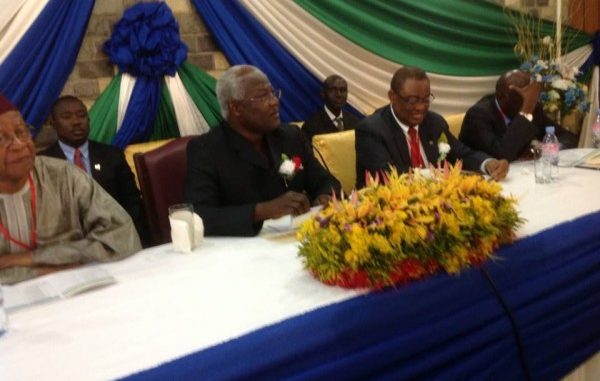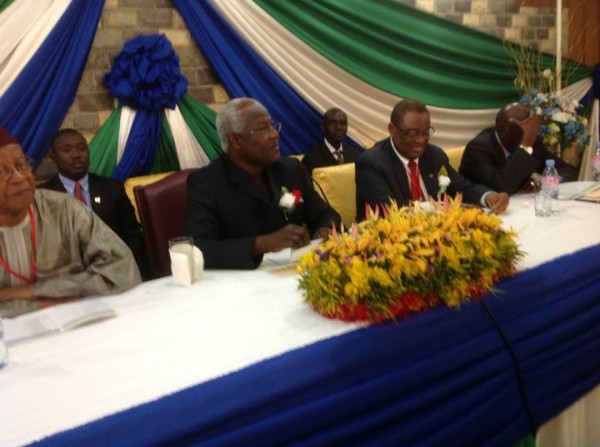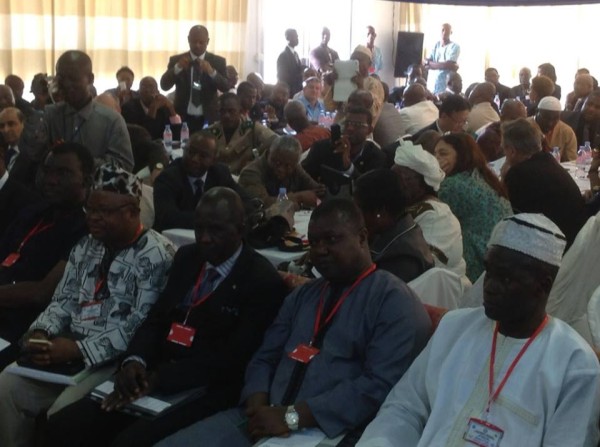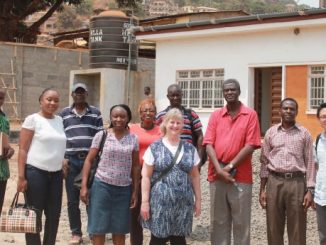
As you can see on the road you travelled on to get to this venue, ours is a country that is being reconstructed. We want this reconstruction and transformation to lead to a nation far better than what this country had ever been. We want this country to be far better than what it was before war broke out in the 1990s; we want to ensure that violent conflict never again grips this nation, and we envision a country that can sustain the great growth rates we have been having in the last few years, a country that is always deepening its democracy, a nation that is a net contributor to world peace, prosperity, and tolerance.
That is why I am very honored to be here today at this conference to set out our vision for Environment, Science, Technology and Innovation in promoting Agriculture, Fisheries and Industrial Development in Sierra Leone. No growth is sustainable without being environmentally friendly, no country can prosper without innovative citizens, and no sector, from agriculture to fisheries and industry, can be competitive in our global society without taking advantage of the best in science and technology.
My Government’s Agenda for Prosperity is informed by this wisdom. And, on behalf of the people of Sierra Leone, and in my own name, I welcome all of you here today to this landmark conference on identifying specific innovative strategies and actions for optimizing the contribution of agriculture, fisheries and industry to achieving the goals we have set for this country in our Agenda for Prosperity.
The Agenda for Prosperity envisions a country that in 22 years will be a middle-income nation. Our economic growth, led by the private sector, will qualify us for that status, and our human development indicators will make our citizens feel like they are truly living in a middle income country.
This is a challenging task, but it is within our right to set out this vision, and it is definitely right to envision science, innovation, and technology as means to achieving our goals. We have identified agriculture, fisheries and industries based on them as sectors where innovation, science and technology hold greater promise for the comprehensive transformation of our society.
With enormous water resources and a large amount of arable land, our nation is a prime candidate for development and industrial growthpropelled by agriculture. Our nation is already,to the greater extent,an agrarian society. Our traditional cultures are molded by the experiences of the farm; the livelihood of 60% of our people depends on agriculture, but we face many challenges in ensuring that our fertile agro-ecologies yield prosperity for our society.
For too long agricultural policies in our continent have paid little attention to value addition and agro-processing. For too long agricultural programs have not struck a balance between primary production and agro-processing, leading us to miss out on skills, jobs, and resources that agro processing and value addition contribute to economic growth and wealth creation. For far too long we have been saddled with weak linkages between primary producers and consumers, ineffective land tenure systems, sub-optimal electricity production, and weak telecommunication networks to link farmers to markets. In the fisheries sector, lack of value addition and IUU have constrained the contribution of the sector to socio-economic development
We recognized these facts in our previous Agenda for Change. That was why our flagship programfor agriculture in the last few years has been the smallholder commercialization program, geared towards moving our people away from subsistence to commercial agriculture. My government and our development partners have invested millions of dollars in the sector, and we have also attracted hundreds of millions of dollars of private sector investment in large-scale plantations and bio-fuels development. We have also made enormous strides in combating Illegal fishing, building jetties and creating framework for transformative intervention in the fisheries sector.
A very major challenge, however, is to ensure that science, technology and innovation become integral both to raising our production levels and improving the quality of our production through value addition. The subsistence production practices of the majority of our people in agriculture have definitely compromised productivity, bringing about lesser yields per acre than what obtains in other continents. We may need to adopt more scientific methods, technology and innovative systems to increase our production levels. But even as we increase our yields, let us be aware that quantity is great, but quality is better. Raising yields per acre is fine, extending the acres that are farmed is warranted, and reducing post harvest loss is a worthy goal, but adding value on to those increased yields is required for the transformation of our societies.
Let us also be aware that raising yields and adding value have environmental implications. In our Agenda for Prosperity we envisage growth that is green, we envisage value addition that respectsour bio-diversity, and we warrant strategies for growth and transformation to comply with the mechanisms we are setting up for the sustainable management of our resources. We have already set up a number of protected parks; environmental impact assessments are now required by law before commencements of projects; and we have established an environmental protection agency that is being strengthened to ensure development strides that are friendly to the environment.
Education plays a key role in creating mindsets and skills for innovative application of science and technology to the sustainable transformation of agriculture, fisheries and industry. But our educational sectors have for far too long produced graduates who love desks more than they love tools, graduates who value desk work over field work, graduates who pay greater attention to seeking employment than to creating employment themselves; graduates who undervalue farm work and factory work, graduates who value consumption over production and value addition.
All type of education is good, but relevant education is better; and relevant education is that which creates synergies of skills and accomplishments along our chains of production, value addition, and markets. We must come up with systems that put researchers, teachers, extension workers, farmers and entrepreneurs in a loop of excellent coordination, high productivity, and wealth creation. And I challenge this gathering to come up with innovative and specific actions for the new educated African, an educated person confident enough to innovate, skilled enough to add value unto what they do, organized enough to create systems, and focused enough to stay the course and achieve the goals we have set out for ourselves.
Our major goal, as you are now aware, is to become a middle-income country in 22 years. We are gathered here to set out the agriculture and agro-industry sector plan for achieving this. We, as a government put agriculture at the very center of the Agenda for Prosperity. That is why, of the 5.7 billion dollars estimates to fund the Agenda for Prosperity over the next five years, over a quarter, about 1.6 billion dollars, is earmarked for the sector.
We believe that investments in agriculture and agro-processing hold far more sustainable potential for achieving the overall goal of the Agenda for Prosperity. But to achieve this, to ensure that science and technology yield their fruits in the agriculture sector, we also need to get a number of things right: we need to get land governance right, we need to get our monitoring and evaluation right, we need to attract more private sector investment, we need to continue the transformation of farmer financing, and more importantly we need to develop a comprehensive program for research and extension.
That is why we are today reiterating our call unto our partners to strengthen their support for the sector. We have established strong partnerships for development of the sector; we may, however, need to build stronger innovative partnerships for agriculture, fisheries and our environment to play their central role in the transformation of Sierra Leone.
We will provide direct oversight of the transformation of the sector from my office.From land tenure reforms to gender equity, we are committed to taking all the steps necessary for the transformation. We will insist on the coordination of the agencies pivotal to transformation of agriculture, and we will ensure that the deliberations and recommendations of this landmark conference become central to our actions for innovation, science and technology in agriculture, fisheries and agro-industry.
With great faith in the commitment of all of us to achieve our set objectives, it is now my honor to officially open the Conference on Setting the Vision for Environment, Science, Technology and Innovation in promoting Agriculture, Fisheries and Industrial Development in Sierra Leone.
I thank you for your attention.






Leave a Reply